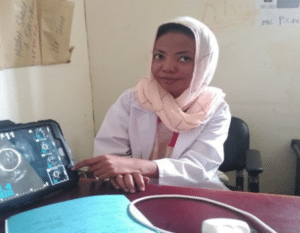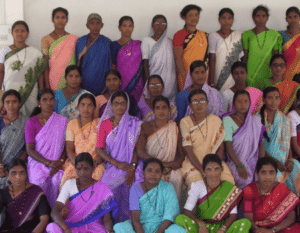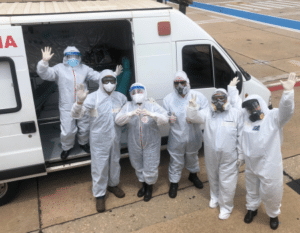World Health Worker Week
31 March 2023
As we mark World Health Worker Week, we are reminded of the critical role that health workers play in ensuring that everyone has access to quality healthcare. Despite the challenges they face, including long hours, limited resources, and, in some cases, dangerous working conditions, health workers continue to be on the frontlines of the global response to health crises. Women make up the overwhelming majority of health workers globally, accounting for approximately 70% of the overall health workforce and 90% of frontline staff. Despite their role working in core health systems roles however, they face unique challenges, including gender-based discrimination, unequal and unfair pay, unsafe work environments and limited opportunities for career advancement.
This week, Women in Global Health (WGH) is proud to feature the stories of some of these dedicated women who are making a difference in their communities, these women are part of WGH’s Heroines of Health. The stories serve as a reminder of the need to invest in health workers, to ensure that they have the resources, training, and support they need to continue providing lifesaving services to those who need it most. We also want to take the opportunity to recognize the importance of promoting gender equity in the health workforce and investing in women health workers. Only by enabling and supporting women working in health can we ensure equitable and effective health systems for the achievement of Universal Health Coverage and global health security.
Ms. Tigist Molla – Delivering Health To The Last Mile

Ms. Tigist Molla is a committed and compassionate Midwife Nurse in Afar Region of Ethiopia, working relentlessly to provide health and care in an area where services are extremely limited. Ms. Molla was trained through Amref Africa’s A’agoa project, a Sexual and Reproductive Health five-year initiative to support pregnant women in remote areas. Using portable medical backpacks and portable ultrasound machines, Ms. Molla works to reach the most vulnerable in hard to reach communities.
“My favorite part of the job is providing health services in the community I grew up in and, in particular, supporting pregnant women. It is so exciting for me to support the community I belong to. I know their culture, understand their language and many of their norms. It is also easy for me to help out and easy for them to open up and share.”
Before the project was launched in 2017, ultrasound devices were exclusive to specialized health professionals and confined mainly to hospitals. Now the program is being implemented in seven districts of the Afar Regional State, enabling Ms. Molla and midwives like her to bring health care services to those hardest to reach.
Through her training and frequent clinical mentorship, Ms. Molla acquired the knowledge and skills to confidently refer high-risk mothers to higher level health facilities for early intervention. “The periodic mentoring and coaching provided by senior health professionals helped strengthen my skills and boost my confidence. I had no capacity or equipment to identify pregnancy anomalies before the training,” she says.
She is passionate about the need to reach communities where they live, regardless of location. “There is no place we can call unreachable. Communities live there, so it is reachable and we can provide the services they need. That is exciting. We can travel to the remotest parts of Ethiopia. If more medical devices become available and health workers get the training we need to operate, we can widen our reach to support our communities.”
In addition to the necessary skills and equipment access, health workers working in rural and remote regions like Afar need also to be willing to live among the communities they serve, says Ms. Molla.
“As long as we are committed to working in the community and living with them, understanding what they need and engaging with them to change their situation, we can improve things. The capacity to do this work at community level has really come as a surprise for me.”
Ms. Molla is committed to working towards the achievement of Universal Health Coverage, realistic about the inequity that is currently preventing that from happening and pragmatic about the ability to roll out ultrasound programs like hers on a wider scale.
“If more and more medical devices are available and health workers get the training to operate, we can widen our reach and support our communities. I serve pastoral communities who lack even basic health services. They should be treated fairly to get essential services for us to claim that we are achieving Universal Health Coverage.”
She believes that health services are a basic human right and health services should reach all communities, including those in remote areas. She has a practical message for decision makers to help inform political commitments.
“I suggest they go down to communities and see what is lacking, see what the health workers lack in terms of resources that they can use to provide essential health services. We need more resources to reach more communities who live in places where there is no infrastructure. Decision makers must make a political commitment to address these issues”.
Women Community Health Workers of SEARCH – Bringing door-to-door care in India
 Ms. Kusum Gadpayale is one of 27 Community Health Workers (CHWs) working in rural India with the Society for Education, Action and Research in Community Health (SEARCH). SEARCH is a non profit organization established in 1985 to reach the vulnerable, semi-tribal and deprived district of Gadchiroli in Maharashtra state.
Ms. Kusum Gadpayale is one of 27 Community Health Workers (CHWs) working in rural India with the Society for Education, Action and Research in Community Health (SEARCH). SEARCH is a non profit organization established in 1985 to reach the vulnerable, semi-tribal and deprived district of Gadchiroli in Maharashtra state.
In 1994, SEARCH enrolled women like Ms. Gadpayale who could read and write and were willing to train to deliver health care in the community. In 1995, local women became part of an experiment in public health to deliver Home-Based Neonatal Care (HBNC). The experiment attempted to reduce the high rate of neonatal mortality. By the end of 1998, the third year of the intervention, infant mortality had dropped by half.
The Community Health Workers were drawn from a region covering 39 villages, and were mostly educated to elementary school level. This was one of the conditions of entering the program. The other was family consent.
“Not all husbands agreed to this, so they chose only those women whose husbands agreed. That was the criteria to get involved. You have to put the work first,” says Ms. Gadpayale, speaking on behalf of the group.
Ms. Gadpayale and her fellow workers, many of whom are small farmers and also work in the home, serve as health messengers educating the larger community on prevention and treatment of common ailments. During the COVID-19 pandemic, they were eager to learn and work on new health topics.
Workers (CHWs) working in rural India with the Society for Education, Action and Research in Community Health (SEARCH). SEARCH is a non profit organization established in 1985 to reach the vulnerable, semi-tribal and deprived district of Gadchiroli in Maharashtra state.
In 1994, SEARCH enrolled women like Ms. Gadpayale who could read and write and were willing to train to deliver health care in the community. In 1995, local women became part of an experiment in public health to deliver Home-Based Neonatal Care (HBNC). The experiment attempted to reduce the high rate of neonatal mortality. By the end of 1998, the third year of the intervention, infant mortality had dropped by half.
The Community Health Workers were drawn from a region covering 39 villages, and were mostly educated to elementary school level. This was one of the conditions of entering the program. The other was family consent.
“Not all husbands agreed to this, so they chose only those women whose husbands agreed. That was the criteria to get involved. You have to put the work first,” says Ms. Gadpayale, speaking on behalf of the group.
Ms. Gadpayale and her fellow workers, many of whom are small farmers and also work in the home, serve as health messengers educating the larger community on prevention and treatment of common ailments.
During the COVID-19 pandemic, they were eager to learn and work on new health topics.
Women went door-to-door with surveys, checking for symptoms and quarantining those who were symptomatic. They also provided sanitizer, masks, and information about social distancing. In return for their health service to the rural and tribal families of Gadchiroli, the health workers can access free healthcare for themselves and their families at the tribal friendly hospital at SEARCH. They are paid a fixed monthly wage of 500 rupees, equivalent to $6, along with pay for additional services they provide in their villages.
“We get paid for work depending on what is needed in the community. Now that we have been working for a while, the needs are not as great as before. It can be from two to six hours per day. We also receive an annual gift. Every year is different, sometimes the gift could be a bicycle or a mobile phone as that helps with the work also.”
Remembering the situation prior to the formation of her group, Ms. Gadpayale illustrates the harsh reality for children in particular. “There was nothing available in terms of healthcare. Kids were dying. A lot of babies were premature, preterm, malnourished. We have helped those kids. Now they are all adolescents. They say ‘it is because of you that we are what we are today!’”
Ms. Gadpayale and her group provide home-based advice on care, non-communicable diseases, maternal and newborn health, and nutrition. They distribute iron tablets and folic acid to eligible women, pregnant women and mothers, they treat infection by administering antibiotics and make hospital referrals for those most at risk. So far, they have cared for 19,952 children and their mothers. “We really enjoy this work because it is new and outside of our normal routine. It is a challenge for us and we learn. We are proud of the children we have saved!”
In terms of ongoing challenges, Ms. Gadpayale says that sanitation is still a concern in the community and she concedes that there is a lot of work to be done. Despite this, she is hopeful and has a word of advice for young people.
“We don’t have much education and look at what we have managed to do for health in the community. Imagine what you can do with the education you have”.
Ms. Monica Batista Teixeira – In the frontlines of a global pandemic
 Ms. Monica Batista Teixeira is a Brazilian nurse with specialization in obstetrics, women’s health and oncology. Like many of her colleagues, she endured extremely difficult conditions during the COVID-19 pandemic, working around the clock without adequate resources or supplies. Despite this, health workers delivered care in rural, hard to reach areas and saved countless lives.
Ms. Monica Batista Teixeira is a Brazilian nurse with specialization in obstetrics, women’s health and oncology. Like many of her colleagues, she endured extremely difficult conditions during the COVID-19 pandemic, working around the clock without adequate resources or supplies. Despite this, health workers delivered care in rural, hard to reach areas and saved countless lives.
With 15 years prior nursing experience, Ms. Batista was working as a Healthcare Manager for chronic diseases at the Amazonas state department when COVID-19 hit. The pandemic has had a devastating impact in Brazil, infecting more than 34 million people and causing an estimated death toll of 685,000. Brazil’s health system struggled under the weight of increased caseloads, limited resources and political instability. At the height of the crisis, health services in the country’s northern region were stretched to breaking point.
The crisis became personal. Ms. Batista learned that her uncle had suffocated from a lack of oxygen in the intensive care unit in Manaus, in Amazonas state. After his death, she departed on the next flight to save others from the same fate. She coordinated and supported the transport of over 900 COVID-19 patients from Amazonas state to health facilities in neighboring states. Her efforts resulted in a 90 percent survival rate among those she transported. For three months, she didn’t see her eight-year-old daughter or family.
Recalling the day when she made the decision to move from health management policy to the frontlines of a global crisis, she describes the compulsion she felt to respond. “The trapped, under siege and war-like situation that COVID caused in the community motivated me to join the fight. I knew we (nurses) were needed.”
Ms. Batista remembers the sense of camaraderie she experienced with fellow workers at that time. She points to the outstanding work of health professionals, specifically highlighting the contribution of women, who make up 65 percent of the Brazilian health force. In some careers, such as nursing, they represent more than 80 percent and were the country’s first line of defense during the pandemic.
“We were all together in the pandemic, not only as health professionals but as service givers. We left our homes, our family, to be on the frontlines. It was very brave of women to make that move. ” The first person to recognize her extraordinary contribution was her daughter, describing Ms. Batista as a heroine, but she is quick to extend this attribute to all women in health.
“It was inspiring to see women’s strength at that moment. The nursing profession is characteristically held by women, but even more so in Brazil. These women who are usually treated as expendable are indeed superheroes in a sense. We all went through the fear of leaving our children, our family, our lives, but we overcame it.”
Ms. Batista is committed to continuing the fight for her community’s right to health and sees women with their unique perspective as essential to that fight. Her advice to all women is simple.
“Anything is possible once you have passion and thoughtfulness. Those are the qualities that make great women leaders. I think women can achieve whatever they want, whether in health or in other areas. It comes down to personal passion, strength and the compassion we have for others. Having that provides us with vision and insight that we can apply in any area.”
As we reflect on the inspiring stories of health workers, let us also remember that their work is far from over. To truly recognize and support their contributions, we must advocate for increased investment in their training, salaries, and working conditions. We encourage you to share these stories and join WGH in calling for sustained investments in health workers throughout the week and beyond. Together, we can ensure that all health workers, especially women, have the resources and support they need to continue providing quality care to their communities. Join us in this critical effort.